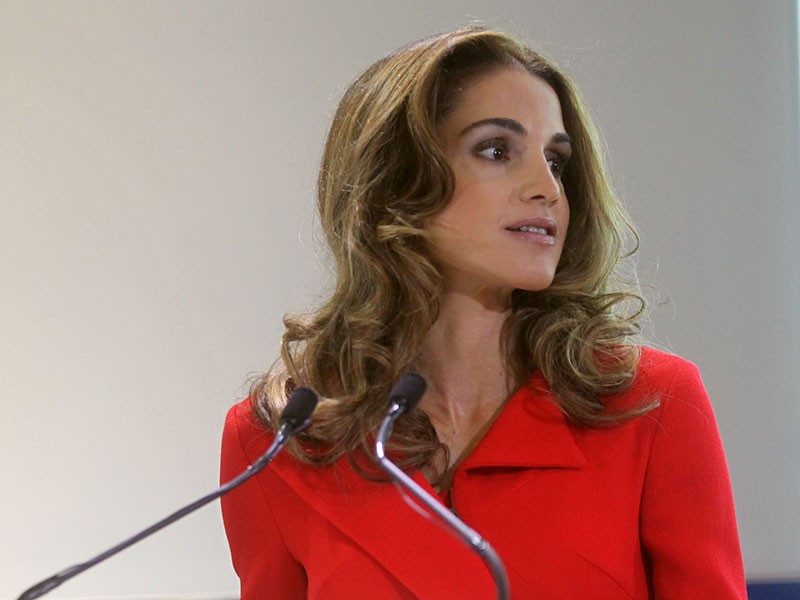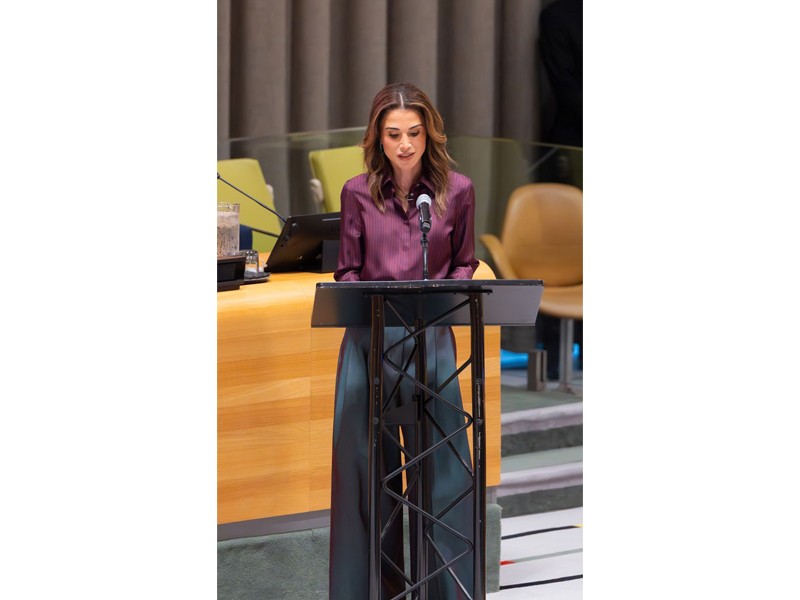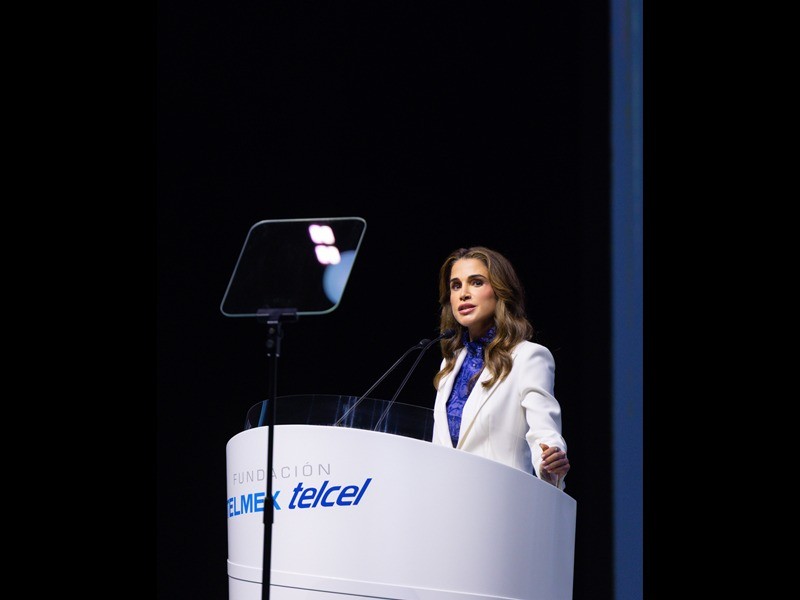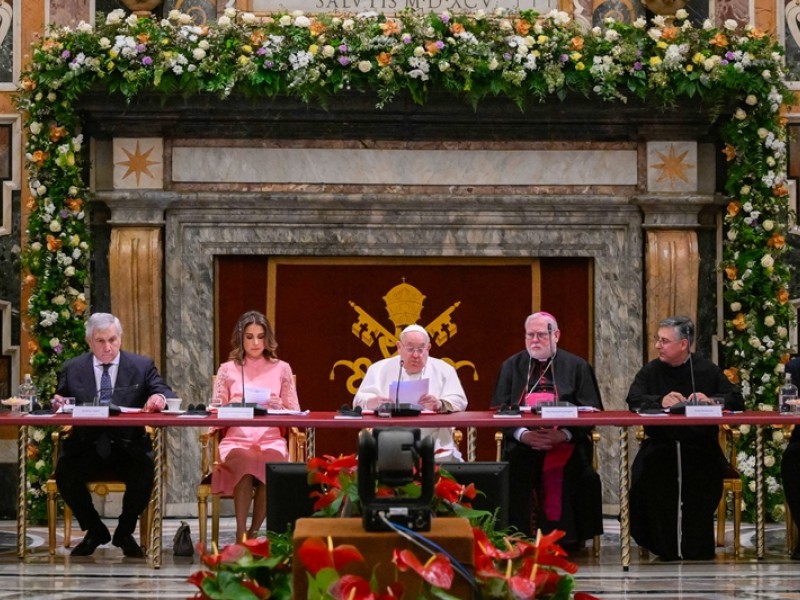Queen Rania's Speech at OECD Forum 2012 - Paris, France
Educating Ourselves Out of Inequality

Thank you, Angel, both for that kind introduction and for your dedicated leadership of the OECD.
Good morning; it’s a pleasure to be here. Thank you for inviting me.
For over 50 years, the OECD has been at the forefront of global co-operation, top-notch analysis, and policy advice.
With age and experience, though, come responsibility and expectation.
And, today, the world looks to the OECD for leadership… for leverage of your global network of partners… and for lasting policies that build better lives.
Especially now. With economic growth faltering… with the gap between rich and poor growing…when meeting the MDG deadline looks unlikely…and when donors’ aid to developing countries has declined for the first time in 15 years.
Because until we build stronger, sustainable societies; until we create equitable opportunities for all…we will erode the foundations of our own prosperity and hold back our own progress.
It’s true that millions of people have been lifted out of absolute poverty in recent years. But the benefits of economic growth have not been shared evenly. Anywhere. Inequality is as rife in low-income countries as it is in advanced and emerging economies.
Into this growing inequality gap, fall those who are impoverished and ill-equipped to climb out. Those old enough to understand its injustices grow ever frustrated. Those too young to know its indignities are condemned to a life of disadvantage from their first breath.
They’re not “the bottom billion”…some amorphous, anonymous mass…some tired, old sound-bite. They’re members of our global family. They have names. They have dignity. And they have hope. In people like you.
Because, slowly, inequality is moving up the development agenda: from postscript to priority. It’s dominating our conference here today, and Rio +20 next month. It’s captured the attention of the IMF, the World Bank, the World Economic Forum, and more.
And talking about inequality is good. But combatting it is better.
Preventing it…would be better still.
You know, better than me, that the solutions to addressing inequality are complex and multi-faceted. And I’m no economist; I don’t have all the answers. But I am a mother of four…and I feel like a mother to all of Jordan’s children. I’m a member of the Global Campaign for Education’s High Level Panel …and I’m a proud advocate for UNICEF.
And I know that the shortest distance between inequality and shared prosperity…is education.
I saw it in South Korea. Education has been critical there in evolving a skilled workforce to create new technologies…build new industries…and generate employment.
I saw it in Brazil and Argentina. Investment in basic education and early childhood health and nutrition there is narrowing the gap between rich and poor.
In research commissioned for his report Beating Poverty, Unlocking Prosperity, Gordon Brown showed that improved levels of learning could increase long-term economic growth by 2 per cent per capita above trend levels.
But despite these compelling examples, education is still the wallflower of the development agenda…too often glossed over in favour of economics and health.
According to the EFA Global Monitoring Report, the share of aid to education has remained static over the last decade: about 12 per cent. And don’t get me wrong, that has brought many benefits…chief among them: access to school for millions of children.
Since 1999, over 50 million more children have enrolled in primary school.
But 67 million are still denied one of their most basic human rights.
And with 2015 quickly approaching, the chances of meeting MDG 2 are fading fast. We are on the verge of failing a generation of children who had the misfortune to be born at the wrong end of the inequality gap.
So, as we turn our attention towards the post-2015 agenda to address new challenges, we must not forget the promises of old.
Going forward, we must deliver ‘basic education and beyond’.
‘Basic’…because we still owe 67 million children an education; we owe them 4 million new classrooms; and we owe them 1.8 million trained teachers.
‘Beyond’… because we have a duty to the next generation to equip them with more than the a,b,c’s. We have a duty to equip them with transferable skills for tomorrow’s job market. Skills… that will allow them to participate...to fulfil their potential…to work their way out of poverty and into prosperity.
Ladies and gentlemen, this is the time for revised priorities…refocused policies…and revitalized commitments. This is the time to educate ourselves out of inequality.
And to do so, I believe there are four areas on which we must focus:
- The first is the link between healthy brains and healthy bodies.
- The second is to start early and focus on the marginalized.
- Third…the hallmarks of education, at all levels, must be inclusion and quality.
- And fourth, schools must be synonymous with skills.
Allow me to unpack each of these briefly.
First. There is no substitute for health and nutrition in the early years of life.
The linguistic and cognitive skills that children develop in early childhood are the foundation for lifelong learning. Lack of nutrients in the first thousand days of a child’s life, cause irreversible brain damage…and often result in those children starting school late…dropping out early… scoring lower grades …and, later in life, earning less.
Ultimately, it perpetuates the inequality gap.
The second is to start early and focus on the marginalized.
85 per cent of a child’s brain develops by the age of five. If that isn’t an argument for providing universal pre-schooling, I don’t know what is.
A 2009 PISA study shows that in 58 out of 65 countries, 15 year old students who had attended at least one year of pre-school outperformed those who had not. But more than half of the world’s children are excluded from pre-school.
The half that needs it the most is the half that is least likely to receive it: the most marginalized children. Providing them with pre-primary education can reduce inequality on day one of primary school…and Every. Single. Day. Thereafter.
Third…the hallmarks of basic education must be inclusion and quality.
Otherwise…what’s the point?
It’s an abuse of children’s rights if they are in school year after year and fail to develop basic skills. But that’s what happens when classes are over-crowded, resources are over-stretched, and teachers are under-trained.
That’s why I’m so pleased that UNICEF is focusing its efforts on quality learning for boys and girls, especially those from impoverished backgrounds.
Last, but not least, schools must be synonymous with skills.
Currently, technological advances are increasing demand for highly educated, innovative, and adaptable employees. But out-dated school systems and obsolete curricula are robbing our young people of the ability to realise their potential.
The result is a chronic misalignment between the knowledge students have… and the skills employers seek.
This is true all over the world. But it is especially heart-breaking for me as an Arab.
Over 60% of the Arab World is under 25 years old. 1 in 4 of them is unemployed… the highest unemployment rate in the world.
Add to that: education. The wrong education. The kind of education that closes doors…fails job interviews…isn’t transferable. That’s the kind of education that governments in the Middle East have invested in for the past decade.
The sum of “unemployment plus un-education” has been all too clear in the last 18 months. You’ve seen it spill onto the streets… frustration at one turn; despair at another.
And at its core, a simple fact: young Arabs want to work. They want a job.
So, we need you to do what you do best. Help us invest in our schools and nurture innovation. Create the conditions in which sustainable jobs grow. Increase access to banks, loans, and business advice. Support government reforms for enterprise development.
And let’s help all the men, women and children who are trapped in the inequality gap. For they need not be there. Let’s give them the best education we can and the tools they need to work their way out of poverty... dignity intact. That is the definition of common humanity. That is a global family. When we look after each other.
And that is what Nobel Peace Prize winner, Jane Addams, meant, over 80 years ago, when she said:
“The good we secure for ourselves is precarious and uncertain until it is secured for all of us…”
Thank you very much.
Featured
Queen Rania's official website
This website does not support old browsers. To view this website, Please upgrade your browser to IE 9 or greater
Your browser is out of date. It has known security flaws and may not display all features of this and other websites. Learn how to update your browser



